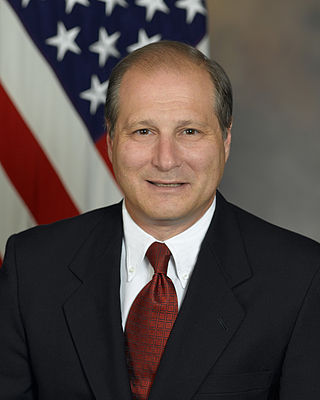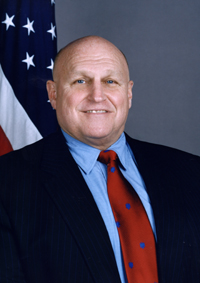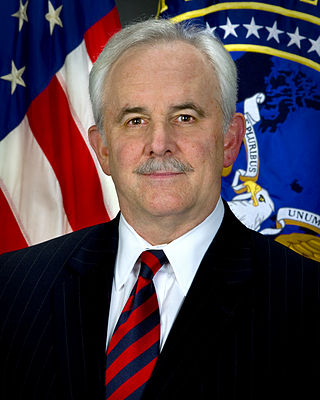
The United States National Security Council (NSC) is the national security council used by the president of the United States for consideration of national security, military, and foreign policy matters. Based in the White House, it is part of the Executive Office of the President of the United States, and composed of senior national security advisors and Cabinet officials.

Paul Dundes Wolfowitz is an American political scientist and diplomat who served as the 10th President of the World Bank, U.S. Deputy Secretary of Defense, U.S. Ambassador to Indonesia, and dean of Paul H. Nitze School of Advanced International Studies (SAIS) at Johns Hopkins University. He is currently a visiting scholar at the American Enterprise Institute.

Zalmay Mamozy Khalilzad is an American diplomat and foreign policy expert. Khalilzad was U.S. special representative for Afghanistan reconciliation from September 2018 to October 2021. Khailzad was appointed by President George W. Bush to serve as United States ambassador to the United Nations, serving in the role from 2007 to 2009. Khalilzad was the highest ranking Muslim-American in government at the time he left the position. Prior to this, Khalilzad served in the Bush administration as ambassador to Afghanistan from 2004 to 2005 and Ambassador to Iraq from 2005 to 2007.

Douglas Jay Feith is an American lawyer who served as Under Secretary of Defense for Policy from July 2001 until August 2005. He is a senior fellow at the Hudson Institute, a conservative think tank.

William Howard Taft IV is an American diplomat and attorney who served in the United States government under several Republican administrations. He is a son of William Howard Taft III and a great-grandson of President William Howard Taft.

The Bureau of Intelligence and Research (INR) is an intelligence agency in the United States Department of State. Its central mission is to provide all-source intelligence and analysis in support of U.S. diplomacy and foreign policy. INR is the oldest civilian element of the U.S. Intelligence Community and among the smallest, with roughly 300 personnel. Though lacking the resources and technology of other U.S. intelligence agencies, it is "one of the most highly regarded" for the quality of its work.

Ashton Baldwin Carter was an American government official and academic who served as the 25th United States secretary of defense from February 2015 to January 2017. He later served as director of the Belfer Center for Science & International Affairs at Harvard Kennedy School.

Charles Thomas Fingar, is a professor at Stanford University. In 1986 Fingar left Stanford to join the State Department. In 2005, he moved to the Office of the Director of National Intelligence as the deputy director of National Intelligence for Analysis and concurrently served as the chairman of the National Intelligence Council until December 2008. In January 2009, he rejoined Stanford as a Payne Distinguished Lecturer in the Freeman Spogli Institute for International Studies.

The School of International and Public Affairs (SIPA) is the international affairs and public policy school of Columbia University, a private Ivy League university located in Morningside Heights, Manhattan, New York City. SIPA offers Master of International Affairs (MIA) and Master of Public Administration (MPA) degrees in a range of fields, as well as the Executive MPA and PhD program in Sustainable Development.

Robert Michael Kimmitt was United States Deputy Secretary of the Treasury under President George W. Bush. He was nominated by President Bush on June 29, 2005. The United States Senate unanimously confirmed him on July 29, 2005, and he was sworn into office on August 16, 2005. Kimmitt served through the end of the Bush administration, leaving office on January 20, 2009.

William Joseph Burns is an American diplomat and served as the 8th director of the Central Intelligence Agency (CIA) during the Biden administration from March 19, 2021 to January 20, 2025. He previously served as U.S. deputy secretary of state from 2011 to 2014; in 2009 he served as acting secretary of state for a day, prior to the confirmation of Hillary Clinton. Burns retired from the U.S. Foreign Service in 2014 after a 32-year career. From 2014 to 2021, he served as president of the Carnegie Endowment for International Peace.

Eric Steven Edelman is an American diplomat who served as Under Secretary of Defense for Policy (2005–2009), U.S. Ambassador to Turkey (2003–2005), U.S. Ambassador to the Republic of Finland (1998–2001), and Principal Deputy Assistant to the Vice President for National Security Affairs (2001–2003). A career Foreign Service Officer, Edelman entered the Senior Foreign Service in 1992. He is a recipient of the Secretary of Defense's award for Distinguished Civilian Service (1993) and the State Department's Superior Honor Award.

Kurt Michael Campbell is an American diplomat and businessman who served as the United States deputy secretary of state from 2024 to 2025. He previously served as deputy assistant advisor to President Biden and National Security Council coordinator for the Indo-Pacific from 2021 to 2024. In this capacity, Campbell had been referred to as the Biden administration's "Asia coordinator" or "Asia czar"—chief architect of Joe Biden's Asia strategy.

Jordan has been a very close ally of the United States for decades, dating back to the establishment of bilateral relations between the two countries in 1949. The country was named a major non-NATO ally of the U.S. in 1996.

Diplomatic relations between Iraq and the United States began when the U.S. first recognized Iraq on January 9, 1930, with the signing of the Anglo-American-Iraqi Convention in London by Charles G. Dawes, U.S. Ambassador to the United Kingdom. The historiography of Iraq—United States relations prior to the 1980s is considered relatively underdeveloped, with the first in-depth academic studies being published in the 2010s. Today, the United States and Iraq both consider themselves as strategic partners, given the American political and military involvement after the invasion of Iraq and their mutual, deep-rooted relationship that followed. The United States provides the Iraqi security forces hundreds of millions of dollars of military aid and training annually as well as uses its military bases.

Richard Lee Armitage is an American former diplomat and government official. A graduate of the United States Naval Academy, Armitage served as a U.S. Navy officer in three combat tours of duty in the Vietnam War as a riverine warfare advisor. After leaving active duty, he served in a number of civil-service roles under Republican administrations. He worked as an aide to Senator Bob Dole before serving in various posts in the Defense Department and State Department.

Thomas Edward Donilon is an American lawyer, business executive, and former government official who served as the 22nd National Security Advisor in the Obama administration from 2010 to 2013. Donilon also worked in the Carter and Clinton administrations. He is now Chairman of the BlackRock Investment Institute, the firm's global think tank.

David Charles Gompert is an American government official and former diplomat who served as the acting Director of National Intelligence (DNI) following the resignation of Dennis C. Blair in 2009. Prior to his ascension as DNI, he was Principal Deputy Director of National Intelligence and continued serving in that capacity until 2011.

David Samuel Cohen is an American attorney who served as deputy director of the Central Intelligence Agency (CIA) from 2021 to 2025, previously holding the position from February 9, 2015 to January 20, 2017. He served as acting director of the CIA from January 20 to March 19, 2021 until the Senate confirmation of William J. Burns.

Alina L. Romanowski is an American career diplomat who had served as the United States Ambassador to Iraq from June 2022 to December 2024. She previously served as the United States Ambassador to Kuwait from February 2020 to April 2022.




















